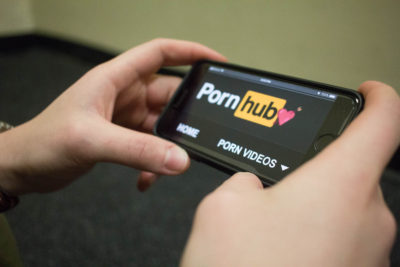
Boston University School of Public Health professor Emily Rothman piloted a study on “pornography literacy” and developed a related high school course designed to help teens critically assess pornography, earning her a feature in a New York Times Magazine article last week.
The Times article, titled “What Teenagers Are Learning from Online Porn,” discusses, among other things, Rothman’s research on how pornography shapes teen sex culture. Rothman ran a study in 2016 of 72 high schoolers aged 16 to 17, with most reporting that porn is their primary source of information on sex.
Rothman also launched a class on porn literacy titled “The Truth About Pornography: A Pornography-Literacy Curriculum for High School Students Designed to Reduce Sexual and Dating Violence.” The class, which is held annually, is funded through Start Strong, a peer-leadership program funded by the Boston Public Health Commission.
More than 20 high school students from Boston Public Schools, including sophomores, juniors and seniors, spend two hours a week participating in group discussions, role-playing and question-answering exercises for five weeks, Rothman said. The course is designed to teach students to analyze how gender, sexuality, aggression, consent, race, queer sex and body image fit into, or are excluded from, pornography.
Bridget Cohen, a freshman in the College of Arts and Sciences, said education surrounding porn literacy could be useful to integrate into a sex-ed curriculum.
“I’d be interested if it wasn’t a full course, but maybe like woven into the curriculum,” Cohen said. “It’s important for kids to know that porn is not a realistic representation of sex.”
So why do young people turn to porn for education on sex?
Sex-ed is only mandated in 24 states, not including Massachusetts, according to the Times article featuring Rothman. Only 13 states require that the curriculum be scientifically and medically accurate. Abstinence-based sex education is still the most popular approach, and teens turn to porn as a how-to study guide to fill the information gap.
Alexander Rosenthal, a freshman in the College of Engineering, said he thinks porn is an unrealistic representation of what real sex is like.
“There is a line between sex with someone you love and the sex in porn,” Rosenthal said. “It’s different because emotions are taken out, and that’s probably not how it should be.”
Rothman said she and her team recognize that a porn-free world is rather unrealistic. But so is porn itself.
Nicole Daley, former director of Start Strong, collaborated with Rothman on building the curriculum, and was one of two women who ran the class. Rather than attempting to obliterate porn media’s presence, Daley said students can attempt to analyze it.
“Sexually explicit content has been around since Pompeii times, so that’s why it’s important to learn how to critically analyze and consume it,” Daley said.
Daley added that she is excited about the Times feature because it starts a dialogue about how to encourage healthy sex and relationships among teens.
“The NYT article did a great job starting the conversation, and my desire is for it to keep going and allow parents and people who work with young people the ability to join it in a meaningful way,” Daley said.
This conversation is one that Varnica Bajaj, a junior in the College of Engineering, said is necessary in order to de-stigmatize sex and sexually explicit media.
“I feel like everything should be an open space,” Bajaj said. “If you’re talking about something natural, but there’s a stigma surrounding [porn], it just makes people think that they’re doing the wrong thing. It’s important to educate people on something as commonplace as viewing porn, so that they can be more critical of what they’re seeing.”
SPH Dean Sandro Galea said he is happy to see Rothman’s research receive attention from the Times.
“I think she’s at the cutting edge of some interesting research that could really change our thinking on this topic,” Galea said. “I’m happy to see her start to get the recognition she deserves.”



